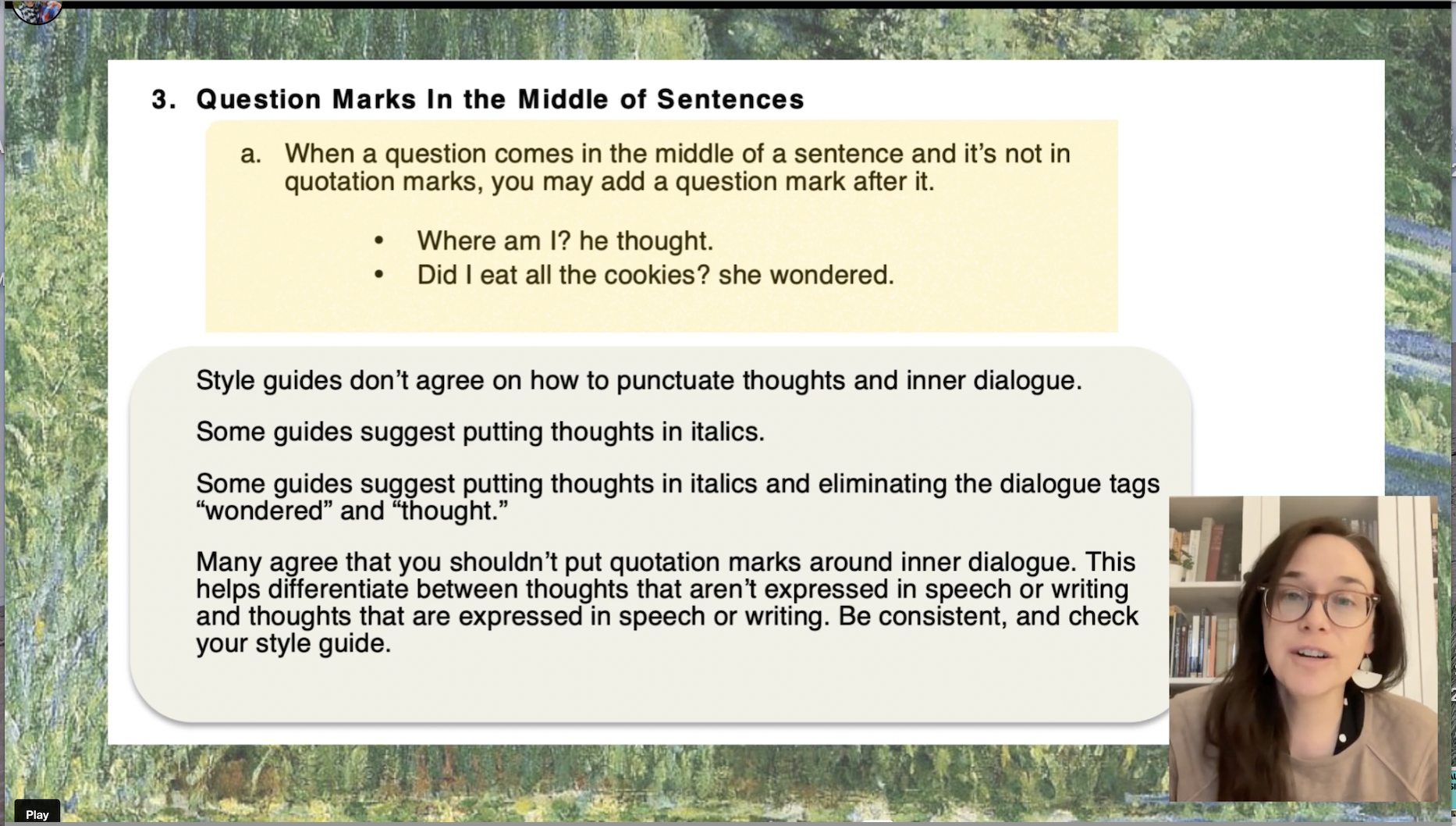Download your free grammar guide here.
When should you use commas with appositives?
When should you use commas with appositives?
- Home
- Punctuation
- Commas With Appositives
Appositives are nouns that rename other nouns. (Remember that nouns are words that name people, places, things, or ideas.) They can be made of one word or more than one word.
The movie Everything Everywhere All at Once won the award for best picture.
"Naatu Naatu," a song by M. M. Keeravani, won the award for best original song.
Everything Everywhere All at Once is an appositive renaming the noun movie. A song by M. M. Keeravani is an appositive phrase renaming the noun "Naatu Naatu."
Seeing them in a sentence diagram can help you understand that they are renaming another noun since we diagram them in parentheses right after the noun that they're renaming.

The author Victor Hugo was born in France.
Since you can already find a whole lesson on appositives here, I won't focus on the definition in this lesson. Instead, this lesson will cover the tricky subject of comma usage with appositives. When should you use commas? When shouldn't you? You're about to find out!
The Two Types of Appositives
Before we talk about commas, there is something important that you need to know.
You already know that appositives are nouns that rename other nouns. By their very definition, they give us more information about the noun that they are renaming. (In order to rename the noun, they must use a new word, or group of words, to do so, right?)
Appositives are not all the same, though. There are two ways that they can rename a noun.
They can define the noun, or they can comment on the noun.
Think about that for just a moment.
If an appositive defines a noun, do you think it's essential to the meaning of the sentence?
Yes! If it's defining the noun, we need it. Notice that we need the appositive to understand the following example.
The movie Everything Everywhere All at Once won the award for best picture.
Just try to make sense of that sentence without the appositive. You can't! Once you take it out, the sentence is basically meaningless. Why? Because Everything Everywhere All at Once is defining the noun movie.
Now, let's change gears. If an appositive comments on a noun, do you think it's essential to the sentence?
No! It's offering a comment, which is nice, but it's not essential to conveying the meaning of the sentence. Notice that you can take out the appositive in the following example, and you'd still be able to understand the sentence.
"Naatu Naatu," a song by M. M. Keeravani, won the award for best original song.
We can take a song by M. M. Keeravani right out of the sentence, and the sentence would still convey the meaning. (There aren't many popular songs titled "Naatu Naatu.") Why? Because this appositive is simply commenting on the noun.
This distinction is very important, so before you move on, make sure that you understand it.
1. Defining appositives are essential. (We need them.)
2. Commenting appositives are nonessential. (We don't need them.)
Are you tired of second-guessing your punctuation?
Let's fix that!
Imagine writing an email, a lesson plan, or even a professional document without stopping to question whether you’re using a comma, dash, or colon correctly.
Lifetime access. One-time payment. No subscriptions. No overwhelm. Click here to learn more! 💛
Defining = Don't Use Commas
As you know, appositives that define nouns are essential to the meaning of the sentence. We need them in order for the sentence to make sense. Here's the scoop on punctuating these guys.
Defining appositives don't have commas around them.
The movie Everything Everywhere All at Once won the award for best picture.
The author Victor Hugo was born in France.
One way to remember this rule is that defining and don't both begin with the letter d.
However ... I have some pretty bad news for you. "Defining appositives" isn't actually a grammar term. Seriously. I'm just using it to help you learn and remember this rule. (I'm sorry if I just burst your bubble.) The good news is that you can use this term as a mental stepping stone to the actual name.
The actual name for a defining appositive is an essential appositive or a restrictive appositive.
That's pretty cool, right? Their name is really descriptive since they are essential to the meaning of the sentence. You can also say that they restrict the meaning of the noun that they rename.
Defining, essential, and restrictive are all ways to describe the same kind of appositive.
Use whichever term resonates with you most. Just know that essential and restrictive are the legitimate grammar names, but my little memory trick with the letter d only works with the word defining.
Essential/Restrictive/Defining Appositives Don't Use Commas
Commenting = Use Commas
You know that commenting appositives are not essential to the sentence's meaning. Here's the scoop on punctuating them.
Commenting appositives need commas around them.
"Naatu Naatu," a song by M. M. Keeravani, won the award for best original song.
My sister, a French teacher, studied abroad in France during high school.
One way to remember this rule is that commenting and commas both start with the letter c.
You have probably already guessed what I'm about to tell you next. "Commenting appositives" isn't an actual grammar term. Again, I'm just using it to help you learn and remember this rule.
The actual name for a commenting appositive is a nonessential appositive or a nonrestrictive appositive. (The prefix non- means not.)
Again, this is the perfect descriptive name because they are not essential to the meaning of the sentence. They don't restrict the meaning of the noun that they rename.
Commenting, nonessential, and nonrestrictive are all ways to describe the same kind of appositive.
Again, feel free to use whichever term you like best, but know that nonessential and nonrestrictive are the legitimate names. And, of course, my memory trick with the letter c only works with the name commenting.
Nonessential/Nonrestrictive/Commenting Appositives Need Commas
Summary & Parting Words
How did that go? I hope that this lesson has been helpful for you. Here's a summary of what you just learned.
Essential/restrictive/defining appositives don't use commas.
Nonessential/nonrestrictive/commenting appositives need commas.
Are you tired of second-guessing your punctuation?
Let's fix that!
Imagine writing an email, a lesson plan, or even a professional document without stopping to question whether you’re using a comma, dash, or colon correctly.
Lifetime access. One-time payment. No subscriptions. No overwhelm. Click here to learn more! 💛

Hello! I'm Elizabeth O'Brien, and my goal is to get you jazzed about grammar.
This is original content from https://www.english-grammar-revolution.com/appositives.html
Our Free Guide Gives You A Fun Way
To Teach And Learn The Basics v

Elizabeth O'Brien is the creator of Grammar Revolution.
Her lessons are guaranteed to give you more confidence in your communication skills and make you smile. :)

